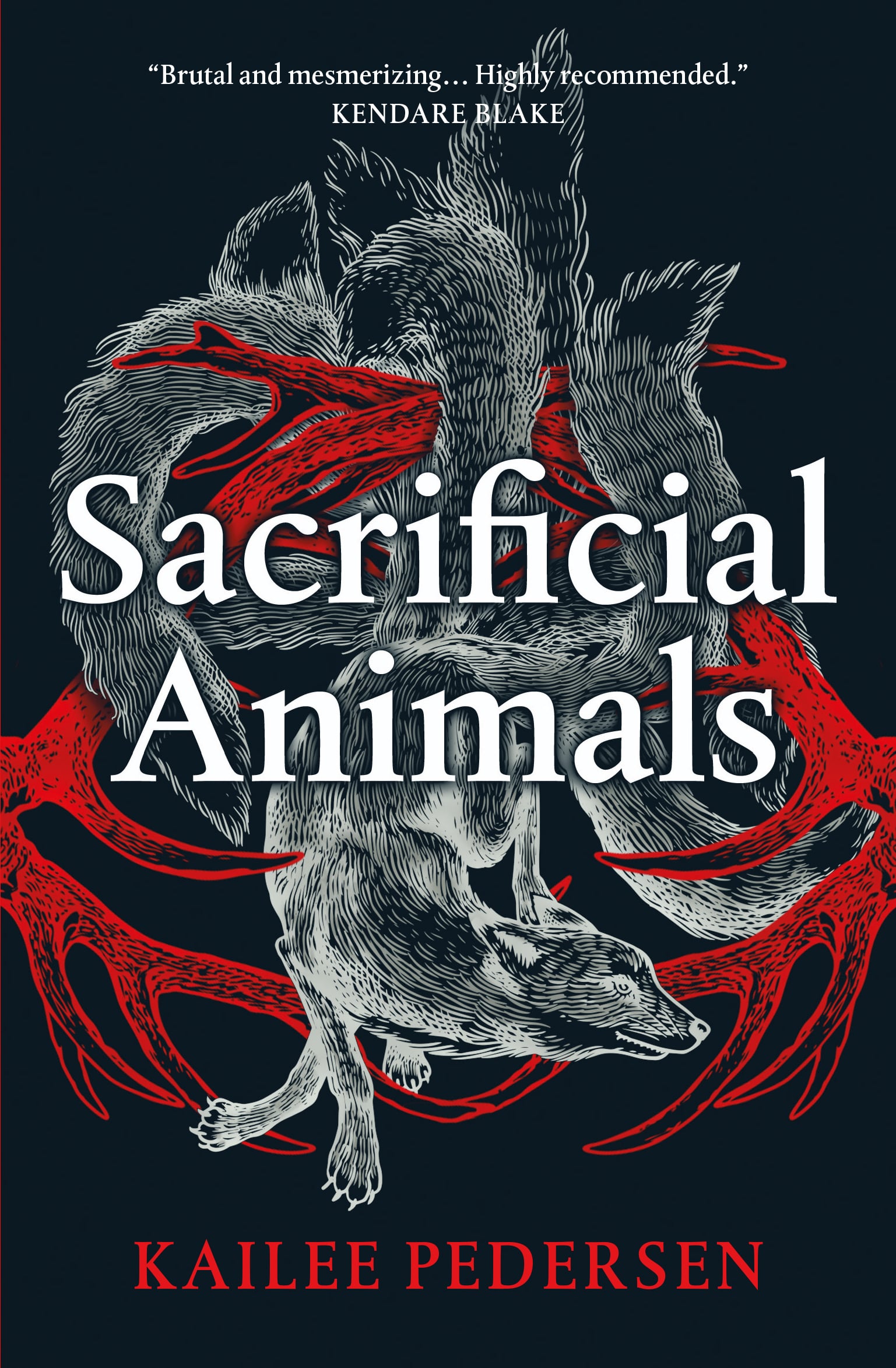Some Thoughts with ... Kailee Pedersen
20 Aug 2024The Author/s

Kailee Pedersen
Kailee Pedersen writes haunted, unsettling speculative fiction. She graduated with a B.A. in Classics from Columbia University, specializing in ancient Greek. Kailee was adopted from Nanning in 1996 and grew up in Nebraska, where her family owns a farm. Her writing on LGBTQ+ and Asian American themes was awarded an Artist Fellowship by the Nebraska Arts Council in 2015.
When not scribbling down her next book, you can catch her singing opera, playing video games, or working as a software engineer in New York City.
Her debut novel, SACRIFICIAL ANIMALS, is forthcoming from St. Martin’s Press (US) and Titan Books (UK). She is represented by Paul Lucas at Janklow & Nesbit.
The Interview
1.- Could you introduce yourself to Jamreads’ readers?
Hi everybody, I’m Kailee. I’m a writer living in New York City. I moved to the city for my undergraduate degree in Classics, and I still maintain my love of ancient Greek and Latin. I currently work as a software engineer and also do a bit of opera singing. My website is kaileepedersen.com.
2.- How did you start writing?
I was an avid reader when I was little — it was a kind of escape for me. Naturally, writing flowed from that, and I began to write down a lot of random stories and poems.
When I went to high school, I had the great fortune of having a wonderful and supportive English teacher, Dutch Fichthorn, who took me seriously as an artist. My freshman year undergraduate Greek instructor, Collomia Charles, was also very encouraging; I am grateful to all my teachers who played a formative influence in my decision to become a writer.
3.- How did the initial idea for Sacrificial Animals appear?
The novel has been percolating in my mind since 2014, but I wasn’t really mature enough as an artist or a person to execute on the idea until I started writing in 2018. I started with a lot of jumbled concepts, including an affair, family drama, a farm setting, and other elements drawn from my childhood in Nebraska, but they didn’t coalesce for a long time.
One of the earliest scenes I remember envisioning, without any context or sense of how it fit into the wider scope of the novel, was of a young boy sitting in the car while his father drives down a long, back country road. The father is angry about something, and shoves his son out of the moving car. Then the son has to crawl back through the grass to the family’s home, which he can see off in the distance. That eventually became part of the first chapter of Sacrificial Animals.
4.- Which part of writing Sacrificial Animals would you say was the most challenging and why?
Honestly, just persisting and finishing the first draft was the hardest part. I actually abandoned the novel at roughly the two-thirds mark and started working on a different (much worse) novel that I never completed, then realized my error and came back about a month later to finish Sacrificial Animals. The first two-thirds of the novel took me several years to write, but then I wrote the final third in a sprint of only a few months.
The writing of Sacrificial Animals also overlapped with 2020 and the height of the COVID pandemic. I lost my job and was unemployed for five months. Like many people, it was a challenging time for my mental health, which impacted my writing significantly.
It’s really important for me to have a deep connection with what I’m writing, because it’s easy to become discouraged and anxious during the process. I wanted to write a novel that conveyed something meaningful about my experiences growing up queer and Asian in Nebraska; I think that was critical in helping me struggle my way to the finish line.
5.- Could you tell us more about the process of querying and preparing this book for submission?
I finished my first draft of Sacrificial Animals in August 2021 and began querying agents in November of that same year after some light revisions. Out of 60 queries, I received 12 full or partial requests, and was very lucky to have 3 agents offer on the novel. I ultimately went with my current agent, Paul Lucas at Janklow & Nesbit, and signed with him in February 2022.
I worked with Paul to revise the novel over the rest of 2022. There were multiple redrafts before we ended up with the final version — the novel started out at roughly 55,000 words and after several rounds of editing, the final length was 75,000 words and I had done a major rewrite on the ending. We went out on submission in January 2023 and I was yet again very lucky to secure my book deal with St. Martin’s Press about a month later.
6.- The way prose is an integral part of this book is quite interesting. Why did you choose this kind of style for your book?
The prose of Sacrificial Animals was heavily influenced by my prior work in poetry and my training in classical music, which I think gives the prose a certain poetic and musical sensibility. Beyond this, I wanted the prose to reflect Nick’s perspective, and I felt dense, emotionally inflected writing was the best way to communicate his inner world and immerse the reader in the unique setting of rural Nebraska.
Cormac McCarthy is an all-time favorite writer for me, perhaps my favorite of favorites, and his influence is very obvious here. I would also cite James Agee’s prose poem Knoxville: Summer of 1915 and its subsequent setting by Samuel Barber to music for soprano and orchestra, as formative for the novel’s aesthetic. Another important influence was Claude Debussy’s incredible opera, Pelléas et Mélisande, and its decadent, sensuous music.
7.- Chinese folklore plays an important role in this novel. Could you tell us more about the idea of including this mythology?
Much of the novel’s setting of Stag’s Crossing, the thousand-acre farm owned by the Morrow family, is directly based on my family’s farm in Nebraska. I always found the woods that surround our farm to be a very contemplative, mystical, and mysterious place. I knew I wanted to draw on my Chinese background for Sacrificial Animals, so I started to think about different aspects of Chinese mythology that could be a good fit for this setting. Without giving anything away, I will just say the natural world plays a huge role in the mythological elements of the novel, and foxes — as featured on the cover — are one of my favorite animals.
8.- Are there other art areas that interest you?
I sing opera locally in the New York City area. The last two summers I’ve traveled to Salzburg to study at the Mozarteum. Before that, I played piano, violin, and flute as a child. Music, especially classical music, has had a major impact on the way I think about writing. I enjoy advocating for and performing the works of LGBTQ+ and Jewish composers especially. Some of my favorite composers include Claude Debussy, Giacomo Puccini, Samuel Barber, John Adams, and Steve Reich.
I also love video games. I even wrote my (very bad) undergraduate thesis on the ancient Greek world in video games. I’m interested in new media, narrative in games, and interactive fiction, and in my free time you can usually find me playing RPGs, TTRPGs (Call of Cthulhu especially), or eagerly awaiting the next Steam sale.
9.- What can we expect from Kailee Pedersen in the future?
I’m currently working on the first draft of my second novel and am frantically typing as we speak! It’s very close to my heart because I have long wanted to write a novel from the Chinese American adoptee perspective. It also touches on my great love of classical music, particularly minimalism. It’s a novel of psychological and body horror about a composer who becomes intent on completing her late mentor’s work, left unfinished at his death, and her spiral into an all-consuming and self-destructive obsession.

Sacrificial Animals is the debut novel of Kailee Pedersen. Personally, one of my top reads of the year, so if you have curiosity, you can read my review here.
You can order a copy of Sacrificial Animals using this link.
